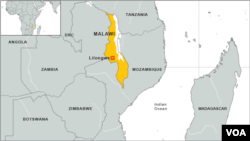Malawi has suspended anti-homosexual laws pending a vote on whether to revoke the legislation, said Justice Minister Samuel Tembenu on Monday.
Malawi suspended a law criminalizing homosexual acts in 2012 pending a parliament review. That law, which lays out a maximum jail sentence of 14 years, was seen by some to be in conflict with a constitution that calls for "respect for human rights."
Because the parliamentary review never happened, law remained on the books and was used to charge two men with sexual acts "against the order of nature" on December 7. Those sodomy charges were dropped Saturday, and the pair was released from police custody, sparking renewed debate as religious leaders and politicians accuse the government of bowing to demands of the international community.
“We are responding to the concerns that people have had that we have breached our international obligation, so people complained, especially the international community,” said Tembenu.
U.S.-based Human Rights Watch and the American and German embassies in Malawi had condemned the mens' arrest.
Malawian religious leaders are now denouncing their unconditional release.
“It is disgusting that a nation can succumb to dictates of the donors and, in the process, lose our identity, our spiritual track and our tradition,” said Reverend Maurice Munthali, spokesman for the Presbyterian church in Livingstonia, a city some 270 miles (435 kilometers) north of the capital, Lilongwe.
Billy Banda, director of Malawi Watch, a local good governance group, accused the government of making a rushed decision, explaining that it would have been more appropriate, to push for an emergency session of parliament to decide the anti-homosexuality law once and for all.
“It is unfair and very unfair," he said. "When we are talking about human rights, we are not talking about [a] minority. There are majority rights as well. So what we are asking now is government must rescind that moratorium. It is un-cultural.”
The issue is quickly becoming a political hot potato for the ruling party. A spokesman for the lead opposition coalition, the Malawi Congress Party, reportedly told local media the government should prioritize on the welfare of poor Malawians over "issues involving one or two people."
According to political scientist Boniface Dulani of the University of Malawi, the moratorium on anti-gay laws, despite its compliance with international norms, comes at a political cost in a country where, polls indicate, disapproval of homosexuality is the norm.
“If you look at survey numbers, you see that up to 95 percent of Malawians disapprove of homosexuality," said Dulani. "This decision ... [can] cost the government some political support.”
The government tried to strike a balance Saturday releasing a statement saying is "committed" to reviewing the anti-homosexuality law but with "consultations with the people of Malawi."
The public has resisted two previous attempts to change the homosexuality law.




